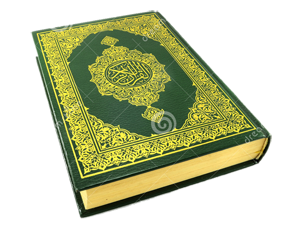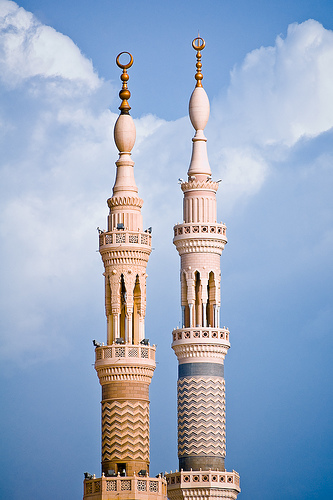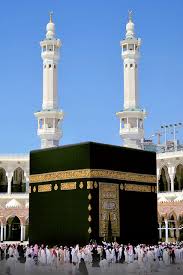Human Rights in Islam
Human Rights in Islam: key thoughts
Ruby Amatulla
The awareness about human rights during the last few hundred years has brought about major changes in the world. However, the Quran, many centuries earlier, laid down the basis of these rights.
A Western thinker, Robert Briffault, asserts that humanity is indebted to the Quran for its progresses. He says, “The ideas that inspired the French Revolution and the Declaration of Rights that guided the framing of the American Constitution and inflamed the struggle for independence in the Latin American countries [and elsewhere] were not inventions of the West. They find their ultimate inspiration and source in the Holy Koran.”
Thomas Jefferson, who wrote the American ‘Declaration of Independence’, kept the Quran in his library. When the library was burned down once, he ordered another copy of the Book. More than two hundred years later the first Muslim congressman, Keith Ellison, took the oath of the office on Jefferson’s Quran
Briffault concurs with scholars such as Thomas Carlyle, Goethe, Margoliouth and many others in their assertions that the Scripture contains seminal ideas about human life and society that are comprehensive and very progressive.
George Bernard Shaw says: "'The future religion of the educated, cultured and enlightened people will be Islam. "
********************
The right of a person is generally denoted as ‘haqq’ in the Quran. The concept of ‘haqq’ is pervasive. Whatever is rightfully due to a person is ‘haqq’. These rights are scattered all over the Quran; some are laid down in straight forward ways but others – more fundamental or inherent rights that a person can claim just by being a human being – are implied but with paramount importance.
The main thrust of Islam is to establish justice and a just society on earth. The goal is peace [one of the meaning of Islam is peace]. The Scripture implies that peace cannot be attained without justice; and justice prevails only when rights are upheld. The Quran expounds that any violation or undermining of a right constitutes an injustice.
The Book says God has made all human beings His representatives or vicegerents [‘khalifa’] on earth [2:30, 6:165, 27:62 ]. Therefore all God’s ‘khalifa’ are equal on earth. Each person can claim the honor and dignity the position ‘khalifa of God’ commands. God is one and all human beings are His creation and servants. In these respects in Islam all human beings are equal before God, therefore, they should be equal before law, society and humanity. The right to equality is fundamental in Islam
It is implied in the Quran that this status of ‘khalifa’ is awarded to humans not arbitrarily but because God has enormously empowered them and made them capable of sensing truth and discerning right from wrong.
Different verses shed light on different aspects of the enormity of this endowment to humans. Prostration is exclusively reserved for God. However after creating Adam, the prototype of humans, God commanded all the angels to prostrate before Adam and thus gave a God-like status to humans. The Quran proclaims, “Indeed, We have conferred dignity on all children of Adam (as their birth-right).” (17:70).
What is the nature of endowment that make a human God-like? The Quran alludes that God has given humans “fitratulla” [fitra means nature] or a God given ‘nature’ or God’s nature or true nature. Then the Book proclaims that the one ever-true religion [al-Din al-Hanif] for mankind is to comply with this ‘nature’ [Quran 30:30]. Any deviation from this nature amounts to injustice, the bigger the deviation the higher the derailment.
Different verses in different places of the Scripture provides glimpses of this endowment “Fitratullah”: it consists of the faculty of reason and conscience, the intuitive and spiritual capacities, the inherent knowledge or wisdom God granted humans, and may be much more. Most of all this enormous capacity enables one to sense truth. By virtue of this empowerment God has granted humans the right to free will. The idea of the ‘Day of Judgment’ and man’s accountability to God rests on the legitimacy that God has granted humans the right to liberty. Therefore the right to equality and liberty are the fundamental rights of a human being.
Next, the right to life comes from the idea that God blows His own Spirit into a human being at the time of creation [15:29] thereby making a life sacrosanct. Killing a human being is prohibited except in the way of justice and/or fighting war against the spread of massive injustices and oppression. The Book expounds that tumult and oppressions are worse than killing as these lead to extreme injustices, inhuman sufferings and a degrading state. The Quran defines ‘crime against humanity’ in terms of killing one innocent human being [5:32]. The Scripture proclaims that if one innocent human being is killed, it is as if entire humanity is killed, and if one life is saved as if entire humanity is saved. This indeed is a higher standard than the one the International Criminal Court [ICC] could come up with fourteen centuries later.
The right to life, liberty, equality, dignity, own and dispose properties, privacy, etc are people’s inherent rights as per the Quran, rights any human being can claim irrespective of his/her religion, race, etc. Protecting and preserving these rights are also the foundation of a modern democratic system.
The thinkers of the European Enlightenment period and later the Founders of the American Revolution who laid down the framework of modern democracy realized that in order to establish a stable progressive society the government must preserve, protect and defend these rights for all citizens. A good governance then is one in which the people holds the ultimate power and the government obtains its legitimacy to rule from the very people it rules and that the government so formed remains limited in its power. A constitution that lays down the framework of a republic with separation of power, proper checks and balances and a system of periodic elections to elect people’ representatives to govern can help attain these objectives.
Fourteen centuries ago, the Charter of Medina [Sahifat al-Medina], the very first constitution written in history, ensured these rights of people in the very first community Prophet Muhammad [pbuh] established in Medina. The system was a federal democratic system in which people of different creed – Muslims, Jews and Pagans – formed a single community ensuring safety and security of life, equal rights, freedom of religion, lifestyle and expression, etc. of all people of the community irrespective of their differences. The Modern day scholars wonder at the similarities between the Charter of Median and the American Constitution that was drafted eleven centuries later. They increasingly discover historical connections for these amazing similarities between the two important historic documents, however that is beyond the scope of this writing.
There are different categories of rights in Islam. Besides the inherent rights, there are specific rights in Islam as to a person’s birth into a family such as inheritance rights and a person’s position in the family such as spousal rights, the position with respect to other people in a group with common cause such as fraternal rights, the rights of neighbors, rights of a member of a community or citizen’s rights, etc. Still there are rights that arise due to efforts and activities such as workers’ rights, trade-partner’s rights, other rights such as the right to presumption of innocence until proven guilty, etc.
A right comes with the responsibility in Islam. The responsibility necessitates exercising discretion and maintaining moderation and balance to avoid conflict and social instability. Freedom of expression is a fundamental right in Islam however the faith does not condone the misuse of this right to arouse hatred, prejudices, and phobias and the abuse of this right to humiliate and disgrace others [49:11,12]. These kinds of misuses and abuses are tolerated in the West in the name of freedom of expression.
Some times some individual rights need to have some limitations for the sake of establishing a healthy society. In the West, however, individual rights are given paramount importance and the collective rights of a society often are ignored or marginalized. As a result, in the name of individual rights excessive greed, materialism, promiscuity, etc. are pursued to the degrees at which the societies tend to become unfair and dysfunctional.
Islam advocates social justice, sharing wealth with the needy and poor, shun excessive materialism, extravagances and live relatively simple. People can become better off or wealthy through rightful means but they should share their wealth with the poor and pay Zakat or the ‘purifying dues’. The poor have a right [haqq] on the wealth of the better off or rich people. All these reasonable restraints are meant to promote and sustain healthy set of values for a society to become stable, peaceful and progressive.
Therefore whenever there is a conflict between an individual right and the collective right of a society Islam advocates striking a balance. As individual rights cannot disregard the collective rights of a society, the collective rights cannot trample individual rights.
Islam grants complete freedom in matters of faith [Quran 2:256]. More than hundred prominent scholars and Imams of our time and some organizations have vehemently disagreed with the assessment that apostasy is punishable by death in Islam. To the contrary They believe there is no worldly punishment for apostasy in Islam. [please see their comments in http://apostasyandislam.blogspot.com/ ]
Women are given equal status with respect to all inherent rights and most other rights except inheritance. In cases of inheritance there are some differences. However, taking all the financial matters into consideration woman and man are at par with each other. Women have the right to own and dispose properties as they wish. They have complete freedom in exercising their rights.
Facing injustices and oppression the people or a group has the collective right to be united and fight to stop rampant violations of rights and justices. Believers are commanded to establish justice. Therefore they have the right and responsibility to struggle to establish justice, peacefully and/or with arms. This is called Jihad in Islam. There are a lot of misconceptions about Jihad both among non-Muslims as well as among Muslims in the world today.
Islam has given paramount importance on peaceful Jihad against wrong and injustices. Believers must exhaust all peaceful and diplomatic means before using their right to take up arms. Patience, perseverance and consistency are advocated in peaceful Jihad. However, if all peaceful efforts – such as dialogue, diplomacy, negotiation, warning even threats -- fail to bring about the change, it is believers’ rights to fight against tumult and oppression.
Facing injustices and oppressions Islam does not allow indifference or looking the other way. Everyone has the right to defend his/her rights or fight for it. The struggle must be relentless and forceful until justice and fairness prevails.
Many major movements of our time that led the world a bit closer to justice and fairness were founded on the values and principles of human rights such as the civil rights, workers rights, immigrants’ rights, women’s liberation, collective bargaining, and most importantly liberation movements in many countries. In essence they address a person’s right to liberty, equality, and dignity.
Our world as we see today largely has been shaped by these fundamental concepts of human rights that the Quran laid down a long time ago. The whole world, in spite of being imperfect and troublesome, has been slowly gravitating towards human rights, fairness and justice, the acceptance of diversity and tolerance [2:148, 5:48], and universalism that the Quran propounded more than fourteen centuries ago.
The most unfortunate thing is that the Muslim world is not at the forefront of this Jihad to establish human rights as there are rampant violations of these rights in many Muslim majority societies. Hundreds of years of false indoctrinations and misplaced priorities have robbed the lights from the ideas expounded by “fitratullah” and “khalifa” in the Quran.
They fail to recognize, among many other issues, that since all human beings -- irrespective of race, religion, gender, etc.-- are representatives [khalifa] of God, the sovereignty of a people collectively then represents the Sovereignty of God. There is no clash between these two ideas of sovereignty: one is temporal and limited and the other is eternal and unlimited.
This can change and it must change. This necessitates a real enlightened process of education, dialogue, patience and perseverance. In essence it needs the peaceful Jihad of the enlightened people in a society. It requires the vigilance and efforts of the thinking people of a society to help arouse the awareness and the commitment of a people that will become the vanguard of a system to help protect their rights and their values
Prejudices, ignorance, fanaticism, extremism, hatred, power-hunger, greed, etc. that violate or compromise rights of people also obstruct justice and hinder peace in the world.









